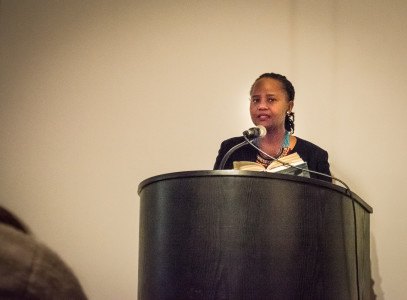
National Book Award nominee and MacArthur Genius Grant Fellow Edwidge Danticat visited Grinnell on Thursday, Feb. 18 as part of the Writers@Grinnell series. In addition to an award-winning author, Danticat is also a dedicated activist for Haiti, her native country. The S&B’s copy editor Susanne Bushman sat down with Danticat to talk about mother-daughter relationships, Haitian voices and works in progress.
The S&B: You’ve written in many different genres. You’ve written fiction, non-fiction and for adults and children. How do you decide what you’re going to write when, and what genre it will be?
ED: Usually an idea presents itself how it wants to be written. … I decide to write something as non-fiction if it feels urgent. … And the fiction, it takes a little while to mull it over, to create characters, to structure the story. Each story that presents itself, I feel … will come to me the way it wants to be written.
Your novel “Breath, Eyes, Memory,” which you mentioned, has a prominent mother-daughter relationship. What made you write on that subject at the time you wrote it and is that something that still interests you today, especially as you have become a mother?
Oh, yeah. It’s something that interests me … even more because last year my mother passed away. So the way that relationship evolves from when you’re a daughter, to then being an adult woman with your mother and then becoming a mother, and all the progressions of that. “Breath, Eyes, Memory” started out as an essay I wrote about my first day in the U.S. and being reunited with my mother. We spent eight years apart when I was a little girl. … It’s something that interests me very much, the way that immigration affects the separation of families, how people are separated. It’s sort of at the core of my own personal experience so that carries over in my work.
Many people perceive you as a prominent voice on Haiti and your relationship with Haiti is very central in your work. Is it something that you feel a lot of pressure to describe well and do justice to? Or is it more of a pleasure?
I try to avoid very much this notion that there can be one person writing about one place. So, again, I think it’s very important for us to hear many voices from different places. In addition to my own work, I work on translations, I do anthologies … really to have a chorus of voices. I’m from a Haitian community—I’ve lived in Haitian communities my whole life—so I know there’s a chorus of voices out there. I’m just one of many voices.
You’ve received accolades including the National Book Award nomination, but you’ve also had your book chosen for the Oprah Book Club. What do you think it is about your books that appeals to both the National Book Award and Oprah?
I don’t know. The writer is the worst person to ask these questions. … I just try to tell an engaging story and I first write it for me. I always hope that it will find a home. And I’m just happy that that’s happened and that different people can read it for different reasons. And I love that both Oprah and the [National Book Foundation] enjoy it. … Toni Morrison has something she says often, like, “Tolstoy didn’t know he was writing for a little black girl in Lorain, Ohio.” So often we write in solitary spaces. You just sit down and write and you hope that the words find a home. And I’ve just been very blessed that my words found homes with different people.
You were young when your first book got published. I know for many writers, it’s a big deal to get published younger than age 30. What’s something that you know now, that you wish you would have known then?
That I didn’t have to kill everyone in my stories (laughs). Writing is … practice. I feel like as I’ve gotten older, I’ve gotten much more interested in nuance, in the shades of gray. And in language, in deepening that. Also, lived experience shows in your writing. I feel like my characters are getting deeper, as I’ve had more lived experience. But we all write from the place we are now … And I think it’s okay to revise that as you go along.
What are you working on now?
I’m working on a book of non-fiction. It’s called “The Art of Writing Death” and it’ll be published by Greywolf Press. … They have a series of craft books. … So mine will be on how writers have written about death—different writers, not everybody, but writers that I’ve read. And I mentioned that my mom passed away last year—so [it incorporates] my own personal experience of writing about death.


























































